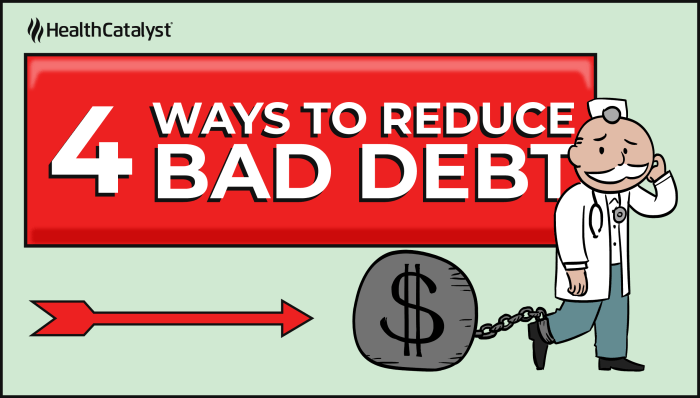How to avoid bad debt sets the stage for this enthralling narrative, offering readers a glimpse into a story that is rich in detail with American high school hip style and brimming with originality from the outset.
Bad debt can be a financial nightmare, but with the right strategies and mindset, you can steer clear of this trap. Let’s delve into practical tips and insights to help you navigate the world of personal finance smoothly.
Understand the Concept of Bad Debt
Bad debt is money borrowed that is not able to be repaid, resulting in financial loss for the borrower. It can have serious implications on one’s financial health and future borrowing opportunities.
Difference between Good Debt and Bad Debt
Good debt is money borrowed for investments that will potentially increase in value over time, such as a mortgage or student loans. On the other hand, bad debt is money borrowed for purchases that do not appreciate in value, like credit card debt or personal loans for non-essential items.
Accumulation and Impact of Bad Debt
- Bad debt accumulates when borrowers fail to make timely payments, resulting in high-interest charges and fees.
- This can lead to a cycle of debt where the borrower struggles to keep up with payments, damaging credit scores and financial stability.
- Having a significant amount of bad debt can limit access to future credit options and hinder long-term financial goals.
Ways to Avoid Bad Debt
When it comes to avoiding bad debt, there are several key strategies to keep in mind. By taking proactive steps, you can prevent financial pitfalls and maintain a healthy financial outlook.
Create a Realistic Budget
One of the most important ways to avoid bad debt is by creating a realistic budget. This involves outlining your monthly income and expenses to ensure that you are living within your means. By setting clear financial boundaries, you can avoid overspending and accumulating debt that may be difficult to repay.
- Track your income and expenses diligently to understand where your money is going.
- Allocate funds for essential expenses such as rent, utilities, groceries, and transportation before discretionary spending.
- Consider using budgeting tools or apps to help streamline the process and stay organized.
Importance of Tracking Expenses
Tracking your expenses is crucial in preventing overspending and accumulating bad debt. By keeping a close eye on where your money goes, you can identify areas where you may be splurging unnecessarily and make adjustments accordingly.
- Review your bank statements regularly to ensure that your spending aligns with your budget.
- Avoid impulse purchases and stick to your budgeted amounts for each spending category.
- Consider setting spending limits or using cash envelopes for discretionary expenses to prevent overspending.
Significance of Building an Emergency Fund
Building an emergency fund is essential in avoiding bad debt, especially when unexpected expenses arise. By setting aside funds for emergencies, you can avoid relying on credit cards or loans to cover unforeseen costs.
- Strive to save at least three to six months’ worth of living expenses in your emergency fund.
- Automate regular contributions to your emergency fund to ensure consistent savings over time.
- Use your emergency fund only for true emergencies, such as medical expenses or car repairs, to avoid depleting it unnecessarily.
Responsible Credit Card Usage

Using credit cards wisely is crucial to avoid falling into the trap of bad debt. It’s important to understand that credit cards are not free money, but a financial tool that needs to be managed responsibly. Here are some strategies to help you use credit cards wisely:
Paying Credit Card Bills on Time
- Set up automatic payments to ensure you never miss a payment deadline.
- Keep track of your spending and budget to ensure you have enough funds to pay off your credit card bill in full each month.
- Avoid making only the minimum payment, as this can lead to accumulating high-interest debt over time.
Avoiding High-Interest Debt Trap
- Avoid taking cash advances from your credit card, as they usually come with high-interest rates and additional fees.
- Try to pay off your credit card balance in full each month to avoid accruing interest charges.
- If you do carry a balance, consider transferring it to a card with a lower interest rate or a promotional 0% APR offer to save on interest costs.
Developing Financial Discipline
Developing financial discipline is crucial in avoiding bad debt and achieving financial stability. By implementing certain techniques, setting financial goals, and prioritizing debt repayment, individuals can take control of their finances and build a secure future.
Controlling Impulsive Spending
Impulsive spending can quickly lead to debt accumulation. To control impulsive spending, it is essential to create a budget and stick to it. Track your expenses, differentiate between needs and wants, and avoid making impulsive purchases. Consider implementing a waiting period before making a big purchase to evaluate its necessity.
Benefits of Setting Financial Goals
Setting financial goals provides a clear direction for your money management. Whether it’s saving for a dream vacation, buying a house, or building an emergency fund, financial goals help prioritize spending and savings. By having specific goals in mind, individuals are more motivated to make wise financial decisions and avoid unnecessary expenses.
Prioritizing Debt Repayment
When dealing with multiple debts, it’s important to prioritize repayment to avoid accumulating more debt. Start by making a list of all debts, including their interest rates and minimum payments. Focus on paying off high-interest debts first while making minimum payments on others. Once a debt is paid off, allocate that payment amount to the next debt on the list. This snowball method helps accelerate debt repayment and reduces overall interest payments.
